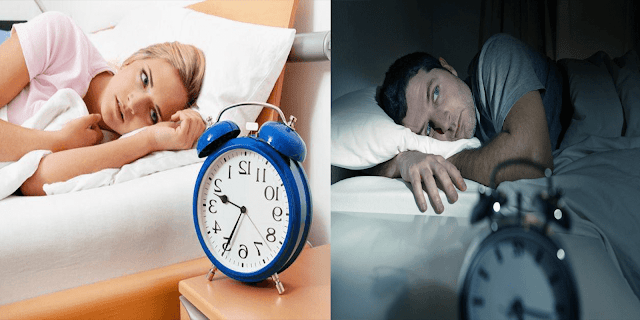According to a research, about half of heart disease patients suffer from sleeplessness

Although sleeplessness has been connected to mental health disorders, this study indicated that it is still associated with cardiac events.
According to a new study, over half of heart disease patients suffer from sleeplessness. The researchers' findings were reported in the journal 'Sleep Advances', "Sleep problems are connected to mental health concerns, but even after accounting for anxiety and depression symptoms, our study revealed that insomnia was still strongly associated with cardiac events," said lead author Lars Frojd, a medical student at the University of Oslo in Norway.
"The findings imply that individuals with heart disease should be evaluated for sleeplessness and given appropriate treatment," she continued.
A total of 1,068 individuals were followed for an average of 16 months after having a heart attack or having a treatment to unblock clogged arteries (stent implantation or bypass surgery). At the start of the study, data on insomnia, risk factors for recurring heart attacks, and co-existing diseases were obtained.
The Bergen Insomnia Scale questionnaire, which is based on the diagnostic criteria for insomnia, was completed by the participants. 3 The ability to fall asleep and stay asleep, waking up early, feeling inadequately rested, fatigue during the day that impacts capacity to perform at work or socially, and being unhappy with sleep are all covered in three questions.
C-reactive protein (an inflammatory marker), smoking status, low-density lipoprotein (LDL) cholesterol, diabetes, physical activity, waist circumference, and systolic blood pressure were among the risk variables. Stroke, transient ischemic attack, peripheral artery disease, and renal failure were among the co-existing diseases.
The primary composite outcome was cardiovascular death, hospitalization due to myocardial infarction, revascularization, stroke, or heart failure, which were defined as cardiovascular death, hospitalization due to myocardial infarction, revascularization, stroke, or heart failure. Data on the outcomes was acquired from hospital records.
Women made up almost one-fifth of the participants (21%). At the start of the study, the average age of the patients was 62 years old, nearly half of them (45%) experienced insomnia, and 24% had taken sleep medicine in the previous week. A total of 364 MACE occurred in 225 patients throughout the course of a 4.2-year follow-up period.
After controlling for age and sex, the relative risk of recurrent MACE in patients with insomnia was 1.62, 1.49 with further adjustment for cardiovascular risk factors, and 1.48 with additional adjustment for co-existing diseases.
 |
| Although sleeplessness has been connected to mental health disorders, this study indicated that it is still associated with cardiac events. |
According to a new study, over half of heart disease patients suffer from sleeplessness. The researchers' findings were reported in the journal 'Sleep Advances', "Sleep problems are connected to mental health concerns, but even after accounting for anxiety and depression symptoms, our study revealed that insomnia was still strongly associated with cardiac events," said lead author Lars Frojd, a medical student at the University of Oslo in Norway.
"The findings imply that individuals with heart disease should be evaluated for sleeplessness and given appropriate treatment," she continued.
A total of 1,068 individuals were followed for an average of 16 months after having a heart attack or having a treatment to unblock clogged arteries (stent implantation or bypass surgery). At the start of the study, data on insomnia, risk factors for recurring heart attacks, and co-existing diseases were obtained.
The Bergen Insomnia Scale questionnaire, which is based on the diagnostic criteria for insomnia, was completed by the participants. 3 The ability to fall asleep and stay asleep, waking up early, feeling inadequately rested, fatigue during the day that impacts capacity to perform at work or socially, and being unhappy with sleep are all covered in three questions.
C-reactive protein (an inflammatory marker), smoking status, low-density lipoprotein (LDL) cholesterol, diabetes, physical activity, waist circumference, and systolic blood pressure were among the risk variables. Stroke, transient ischemic attack, peripheral artery disease, and renal failure were among the co-existing diseases.
The primary composite outcome was cardiovascular death, hospitalization due to myocardial infarction, revascularization, stroke, or heart failure, which were defined as cardiovascular death, hospitalization due to myocardial infarction, revascularization, stroke, or heart failure. Data on the outcomes was acquired from hospital records.
Women made up almost one-fifth of the participants (21%). At the start of the study, the average age of the patients was 62 years old, nearly half of them (45%) experienced insomnia, and 24% had taken sleep medicine in the previous week. A total of 364 MACE occurred in 225 patients throughout the course of a 4.2-year follow-up period.
After controlling for age and sex, the relative risk of recurrent MACE in patients with insomnia was 1.62, 1.49 with further adjustment for cardiovascular risk factors, and 1.48 with additional adjustment for co-existing diseases.
After controlling for age and sex, the relative risk of recurrent MACE in patients with insomnia was 1.62, 1.49 with further adjustment for cardiovascular risk factors, and 1.48 with additional adjustment for co-existing diseases.

Comments
Post a Comment